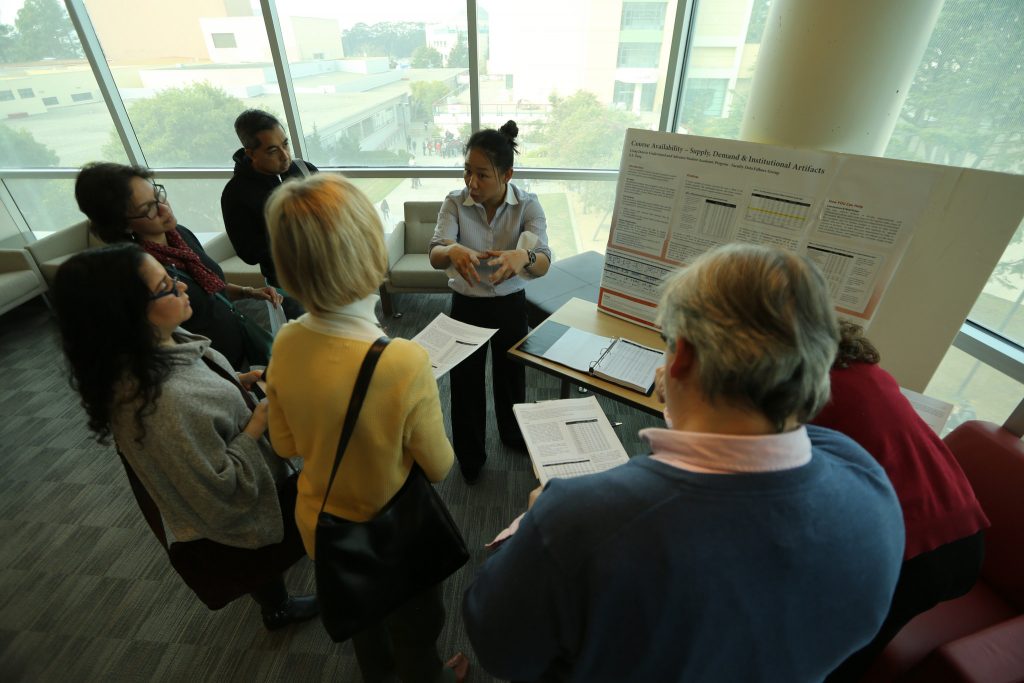Critical improvements to SF State students’ academic progress may be in store as a group of faculty members under the Division of Undergraduate Education and Academic Planning presented their findings on student success in a meeting Wednesday, Dec. 2. in the J. Paul Leonard Library.
As part of SF State’s plans to improve its six-year graduation rate from 50 to 65 percent by 2025, a group of 10 faculty members dubbed “the Data Fellows” analyzed data this past summer pertaining to SF State’s academic progress and graduation rates to see how and where students come up short, and what the University can do to improve those weaknesses, according to the Campus memo.
“We want to figure out why students are not making it all the way through,” said Dean of Undergraduate Education and Academic Planning Jennifer Summit. “We want to raise that visibility (and) invite everyone to think about student graduation as a core commitment that spans the campus.”

The Data Fellows found that 39 percent of graduating seniors believed improvements in course availability and advising would have improved their SF State experience, according to results from the SF State Senior Exit Survey, reported Oct. 27.
Inadequate course availability can be chalked up to SF State‘s lack of a standard class-scheduling time block, which can cause class overlaps, according Summit, who also said students failing to pass their courses can also hinder class availability.
“If a student fails a class and goes to re-take it, the seat they are now taking could have gone to someone who needed to take the course for the first time,” Summit said.
Course schedules are currently built six weeks before the beginning of class registration, according to Jo Volkert, vice president of enrollment management.
Students majoring in computer science are particularly affected by class availability, according to computer science majors Samuel Gluss and Kenny Luo.
“I think overlapping classes is a great problem to fix,” Gluss said. “I’ve heard of people’s classes overlapping by 30 minutes.”
Progress will have to stretch further than the meeting, according to Luo, who said hiring more professors in order to help prevent certain departments from becoming impacted would help
“I think that having the meeting is a step in the right direction,” Luo said. “I think if they want to see actual change, though, more work needs to be done.”
An understaffed and poorly located advising center also proves detrimental to students, Summit said, since students may be unknowingly taking classes that aren’t necessary for their major.
The success of ethnic students and students of color was also examined in the project, according to Cindy Huynh, a lecturer in the ethnic studies program and a Data Fellow who focused on the topic.
“We have to assess the campus racial climate to make sure our students are feeling welcome, (and) if our students are finding it as a productive learning space,” Huynh said.
Participating in the Data Fellows faculty group helped correct assumptions some faculty members had about student success, said Hsiao-Yun Chu, an associate professor in the design and industry department.

“Many faculty members assumed that having a part-time job would negatively impact a student’s success, but the numbers showed that this was not necessarily the case,” Chu said. “A well-organized student can hold down a part-time job and still be academically successful.”
The Data Fellows are committed to bringing President Wong’s vision of a higher graduation rate by 2025 to fruition through redesigning department curriculum and creating campus support systems to better help students, according to Summit.
The hiring of tenure-line faculty will be necessary to implement these changes, and the University has put aside an undisclosed amount of money for this purpose, Summit said.
Continued faculty development is a vital part of offering the best support to students, according to Huynh.
“We need to make sure we are engaging, that we do come off as accessible to our students (and) that we know how to respond to urgent needs of our students,” Huynh said. “Our students are continually evolving, and our faculty needs to continue evolving.”
With this new research, the University aims to improve SF State students’ experiences while at the same time ensuring their success, according to Summit.
“Every student experiences their time here as unique, so we want to be responsive to what we hear from students about what they need in order to navigate the system,” Summit said. “We want to make sure students are graduating with degrees that are worth their effort and investment, that they represent the best quality undergraduate education. Graduation rates is just a starting point, but it’s a powerful one.”







